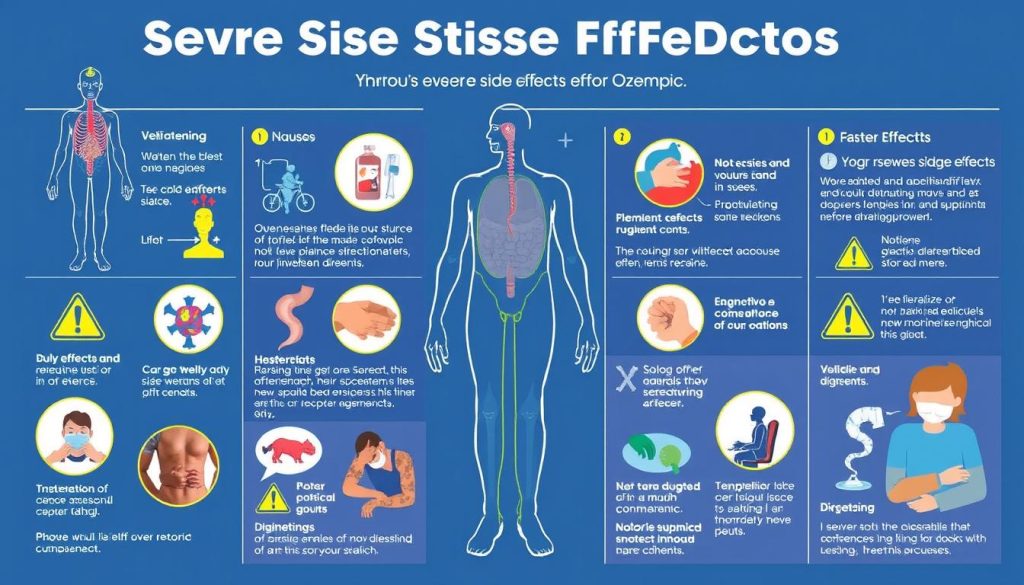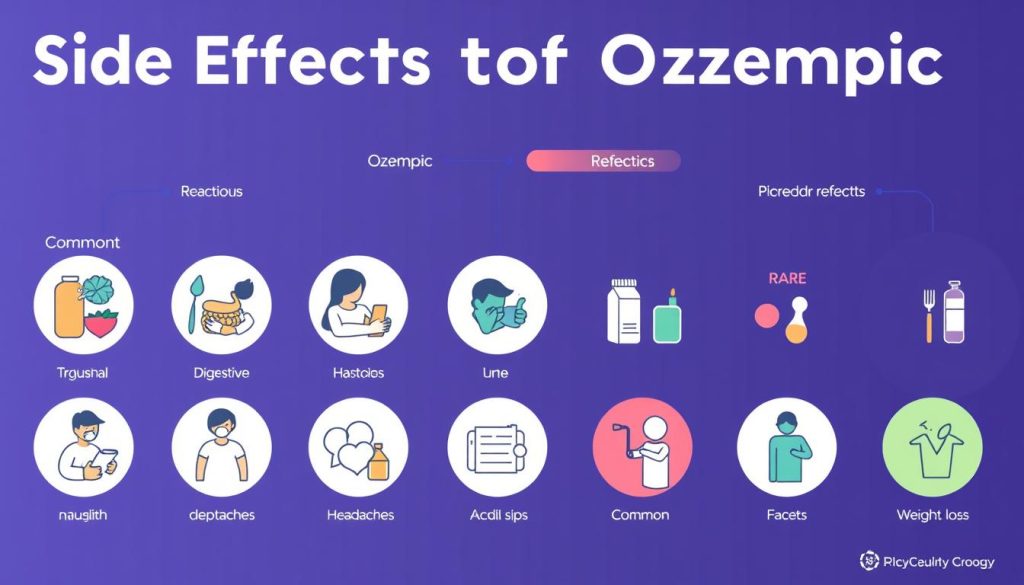More people are using Ozempic to manage type 2 diabetes and obesity. It’s crucial to know the side effects of Ozempic for both patients and doctors. Ozempic helps control blood sugar and aids in weight loss, but it’s important to understand its side effects.
Here, we’ll share Ozempic treatment insights and ways to manage side effects of Ozempic. Our goal is to give a detailed guide for those thinking about or already taking this medication.
Key Takeaways
- Knowing about Ozempic side effects is key for safe use.
- Managing side effects can make life better and help stick to treatment.
- Ozempic treatment insights help set realistic goals and outcomes.
- Strategies to manage side effects can lessen their impact.
- An informed patient can better handle diabetes and weight management therapies.
Understanding Ozempic and Its Therapeutic Role
Ozempic, also known as semaglutide, is key in managing diabetes. It works by helping the body control blood sugar levels. This makes it a vital tool for those with type 2 diabetes.
Ozempic does more than just control blood sugar. It also helps with weight loss, a big issue for many with type 2 diabetes. It acts like an incretin hormone, boosting insulin when you eat. This not only helps with blood sugar but also reduces hunger, aiding in weight control.
Even though it’s very effective, it’s important to know about Ozempic medication side effects. These can include stomach problems like nausea and less hunger. These are things to think about when managing diabetes.
| Function | Benefits | Potential Side Effects |
|---|---|---|
| Blood Sugar Regulation | Improves glycemic control | Minimal risk of hypoglycemia |
| Appetite Suppression | Aids in sustained weight loss | Nausea, decreased appetite |
| Cardiovascular Benefits | Reduced risk of major cardiovascular events | — |
Knowing how Ozempic works and its possible side effects helps patients make better choices. This is crucial for managing diabetes and staying healthy.
Common Side Effects of Ozempic
Ozempic is a medication used for weight management and metabolic health. It has changed how we manage type 2 diabetes. But, it can cause side effects that affect daily life. Knowing these side effects helps patients and doctors manage them better.
Gastrointestinal Issues
Gastrointestinal discomfort is a common side effect of Ozempic. Symptoms like nausea, vomiting, and diarrhea are common. These side effects can be intense at first but often lessen over time.
Changes in Appetite and Weight
Ozempic can make you feel less hungry, leading to weight loss. This is a good thing for those trying to lose weight. But, it’s important to watch your diet to make sure you’re getting enough nutrients.
Metabolic Disturbances
Ozempic helps with blood sugar levels and heart health. But, it can also cause some problems. These include changes in blood sugar levels. People with diabetes need to watch their levels closely.

| Side Effect | Prevalence | Management Strategies |
|---|---|---|
| Nausea | Common | Small, frequent meals; Avoiding fatty or spicy foods |
| Diarrhea | Moderate | Adequate hydration; Dietary adjustments |
| Weight Loss | High | Nutritional support; Monitoring by healthcare provider |
| Blood Sugar Fluctuations | Variable | Regular monitoring; Adjusting medication doses under guidance |
The Science Behind Ozempic Medication Side Effects
The Ozempic side effects some patients experience come from how it works. To grasp these effects, we must look at its action on the body. Ozempic, or semaglutide, acts like a GLP-1 receptor agonist. It mainly affects insulin and blood sugar levels, key for type 2 diabetes control.
Looking into the drug mechanism, we see Ozempic boosts insulin when blood sugar is high. It also cuts down on glucagon when it’s not needed. This balance helps keep blood sugar stable. Yet, it can cause stomach issues, a common side effect, by affecting gut hormones and absorption.
It’s crucial for healthcare providers and patients to understand Ozempic’s side effect profile. Knowing what side effects to expect and why helps manage them better. For example, nausea and vomiting are linked to its impact on stomach movement and hunger control.
| Ozempic Effect | Mechanism | Common Side Effects |
|---|---|---|
| Insulin Stimulation | Increases insulin release | Low blood sugar levels |
| Decreased Glucagon | Reduces hepatic glucose production | Chills, dizziness |
| Gastric Emptying Delay | Slows gastrointestinal motility | Nausea, abdominal pain |
Understanding Ozempic’s drug mechanism clarifies its effects and boosts patient comfort. Recognizing and handling its Ozempic side effects quickly can greatly improve treatment results. This knowledge is key to a more active diabetes management approach.
Real-World Experiences: Patient Testimonials on Ozempic
Exploring the real-world side effects of Ozempic, patient testimonials give us a unique look. They show how people manage diabetes with this drug. These stories let us see into their health journeys, highlighting their patient experience with Ozempic.
Ozempic affects people differently. Some face little side effects, while others deal with bigger challenges. Common issues include stomach problems, changes in appetite, and weight shifts. These effects match what doctors say but vary based on personal health and body.
“Starting Ozempic was a big choice for me. At first, the nausea was tough. But changing my diet and eating smaller meals helped a lot,” said one user.
- Increased satiety leading to better diet control
- Improved blood sugar levels, as seen in tests
- Concerns over long-term effects, a topic in forums and groups
These patient testimonials show the real-world side effects of Ozempic. They also stress the need for patient education and health management. Talking to doctors about side effects is key when starting new meds. Hearing how others handle similar issues is also important.
These stories highlight the need for tailored treatment plans in diabetes care. They add real-life context to what doctors say. They show that how Ozempic affects people can vary a lot.
Comparing Side Effects: Ozempic vs Other Diabetes Medications
When it comes to managing diabetes, knowing the side effects of medicines is key. This part looks at the diabetes medication comparison, focusing on Ozempic and other drugs. Knowing these differences helps patients and doctors make better choices.
Unique Characteristics of Ozempic Side Effects
Ozempic, or semaglutide, has side effects that stand out. It can cause nausea and vomiting more than other diabetes drugs. But, it also helps with weight loss, which is a plus for many.
These special side effects can help patients stick to their treatment and feel better about it.
Risk-Benefit Profile of Ozempic
Looking at Ozempic, it’s important to weigh the good against the bad. It lowers blood sugar and can help the heart, but it might raise the risk of thyroid tumors and pancreatitis. For many, the benefits are worth the risks.
Every person is different, so talking to a doctor is crucial before starting Ozempic.
| Medication | Common Side Effects | Risk of Serious Side Effects | Notable Benefits |
|---|---|---|---|
| Ozempic (Semaglutide) | Nausea, Vomiting, Diarrhea | Thyroid tumors, Pancreatitis | Highly effective in reducing glucose levels, significant cardiovascular benefits |
| Other Diabetes Medications | Varies widely | Varies, generally lower risk of thyroid issues | Depends on the specific drug, generally effective in managing blood sugar |
Comparing shows that while all drugs have risks, Ozempic’s unique benefits make it a good choice for many with type 2 diabetes. A detailed risk-benefit analysis is key to managing diabetes well and avoiding bad side effects.
Identifying Severe Side Effects of Ozempic
Understanding drug safety is key. Knowing the severe side effects of Ozempic is crucial. Ozempic helps manage type 2 diabetes but comes with risks. It’s important to know these risks for your health.
Pancreatitis and thyroid tumors are serious side effects. Catching these early can prevent worse problems. Look out for severe stomach pain, nausea, vomiting, and unexpected weight loss. If you see these signs, get medical help right away.
- Persistent severe abdominal pain: This can signal pancreatitis.
- Newly developed or worsening swelling in the neck: Could indicate possible thyroid issues.
- Unexplained weight loss or loss of appetite.
- Changes in bowel movements or persistent nausea.
It’s vital to manage and identify these potential side effects of Ozempic. This ensures drug safety. Teaching patients about these risks is a key part of good healthcare.
| Side Effect | Symptoms | Immediate Actions |
|---|---|---|
| Pancreatitis | Sudden, severe abdominal pain, nausea, vomiting | Consult healthcare provider immediately |
| Thyroid Tumors | Swelling in the neck, difficulty swallowing | Seek medical evaluation to rule out malignancy |

Managing Side Effects of Ozempic
When you start taking Ozempic, it’s important to know how to handle side effects. This helps keep your treatment effective and your life quality high. By adjusting the dosage, making lifestyle changes, and knowing when to see a doctor, you can lessen side effects.
Adjusting Dosage and Timing
Changing the dosage of Ozempic can help manage side effects. Talk to your doctor about your symptoms. They can adjust the dosage or when you take it to make it more comfortable for you.
Lifestyle Modifications and Side Effect Management
Some lifestyle changes can also help with side effects. Here are a few:
- Changing your diet to ease stomach problems
- Starting gentle exercise to boost your metabolism
- Drinking plenty of water, especially if you’re feeling queasy
These changes can help Ozempic work better and improve your health overall.
When to Seek Medical Attention
If side effects get worse or don’t go away, you should see a doctor. Signs like severe stomach pain, big changes in blood sugar, or allergic reactions need quick help. A doctor can offer the right advice and help to keep Ozempic safe and effective.
Ozempic in Special Populations: Precautions and Care
When it comes to Ozempic precautions, it’s key to consider special populations. This includes pregnant women, the elderly, and those with liver or kidney disease. Knowing how to care for these groups ensures everyone gets safe, effective treatment.

Treatment Considerations change a lot for different patients. For example, pregnant women and the elderly might need different doses or more checks. It’s also important to know how the drug works in people with kidney or liver problems.
| Population Group | Precautions | Recommended Monitoring |
|---|---|---|
| Pregnant Women | Careful benefit-risk assessment | Regular glucose level checks |
| Elderly Patients | Dose adjustments based on renal function | Kidney function tests |
| Patients with Renal Impairment | Reduced dosing frequency | Nephrology consultation and frequent serum creatinine tests |
Ozempic precautions mean we need to tailor care for special groups. By following treatment considerations, doctors can make sure these patients get the best care. This balances safety with how well the treatment works.
Medical Expert Insights on Ozempic Side Effects
Understanding Ozempic’s side effects is crucial. We need to hear from expert insights on Ozempic from doctors. This part looks at what endocrinologists and primary care doctors say. They share their endorinologist advice and how to keep an eye on things through primary care monitoring.
Endocrinologist Perspectives
Endocrinologists are key in managing diabetes and its medications, like Ozempic. They know a lot about hormonal side effects and keeping an eye on blood sugar.
They suggest a treatment plan that fits each patient. Regular check-ups and tests help adjust the treatment to avoid bad side effects.
Primary Care Advice on Monitoring Side Effects
Primary care doctors stress the need for regular checks to catch any Ozempic side effects early. They suggest regular visits to review health and adjust treatments as needed.
They also teach patients about symptoms that mean they should see a doctor right away. This is a big part of their monitoring work.
| Expert | Key Insight |
|---|---|
| Endocrinologists | Focus on hormonal balance, importance of personalizing treatment plans. |
| Primary Care Physicians | Emphasize the importance of routine monitoring and patient education on when to seek help. |
Debunking Myths: The Truth About Ozempic Side Effects
In the world of diabetes and weight loss, Ozempic is a well-known drug. But, myths about Ozempic are common. These myths can worry people or give them wrong hopes.
Many think Ozempic’s side effects are always bad. But, the truth about side effects is they differ for everyone. They can often be managed. It’s key to know the real facts from the myths.
| Myth | Fact |
|---|---|
| Ozempic invariably leads to serious gastrointestinal issues | While some users may experience nausea or stomach upset, many find these issues manageable or temporary |
| Ozempic’s effects are purely cosmetic, focusing only on weight loss | Ozempic is primarily used to improve blood sugar control in type 2 diabetes, weight loss is a secondary effect |
| Adjusting lifestyle cannot mitigate Ozempic side effects | Lifestyle adjustments, like dietary changes and exercise, can significantly reduce side effects |
For those looking into managing diabetes and weight, knowing about Ozempic side effects is vital. Learning from trusted sources helps you make informed choices.
To clear up Ozempic misinformation, talking to doctors is crucial. They can give advice tailored to your health. Knowing the truth about side effects means understanding that while some may face them, many use Ozempic safely.

The Side Effects of Ozempic
With patient awareness growing, it’s key to explore the side effects of Ozempic. This is especially true for those with type 2 diabetes. Knowing the risks helps patients manage their treatment better.
Ozempic helps control blood sugar by mimicking a hormone. But, it can cause side effects. Gastrointestinal issues are the most common. Changes in appetite and weight loss are also common.
Understanding these side effects is crucial. It helps manage them, making treatment safer and more effective.
- Nausea and vomiting
- Headaches and dizziness
- Abdominal pain
- Constipation or diarrhea
To raise patient awareness, here’s a look at several studies on side effects of Ozempic.
| Study | Reported Side Effect | Frequency |
|---|---|---|
| Study A | Nausea | 30% |
| Study B | Headaches | 25% |
| Study C | Abdominal Pain | 20% |
Knowing these risks is key to understanding drug reactions. Talking openly with doctors and reporting side effects helps tailor treatments. This approach is vital for better diabetes care and patient safety.
Legal and Regulatory Aspects of Ozempic Side Effects
It’s important to know about Ozempic legal considerations for both patients and doctors. This part talks about drug regulation and FDA side effect guidelines for Ozempic. It helps us understand what these mean in real life.
Ozempic is a drug approved by the FDA. It goes through a lot of checks. The laws around its approval make sure all side effects are shared with doctors and the public.
FDA guidelines for reporting side effects are strict. They help keep patients safe and make sure the drug works well. It’s key for patients to know these rules are for their protection.
From a regulatory standpoint, Ozempic’s approval and ongoing checks involve lots of paperwork. This paperwork includes reports of side effects from clinical trials and after the drug is on the market. This openness is key to keeping the drug safe.
- Initial FDA Approval Process
- Ongoing Monitoring and Reassessment
- Guidelines for Reporting Side Effects
- Legal Obligations for Manufacturers
- Implications for Healthcare Providers
Also, all Ozempic legal considerations cover how warnings and safety tips are shared. These laws make sure every Ozempic package has clear info. This info tells patients how to use the drug right and report any side effects.

The rules around drug regulation and FDA side effect guidelines are complex. So, it’s crucial for doctors and patients to keep learning about Ozempic. This helps use the drug right and lowers the risk of side effects.
By knowing about the legal and regulatory sides of drugs like Ozempic, patients can make better choices. They can understand their rights and help keep themselves safe and healthy.
Conclusion
Our detailed look at Ozempic and its side effects shows why it’s key to understand and manage them well. We talked about stomach issues, changes in appetite, and how it affects your body. This highlights the need to tackle these problems head-on when treating diabetes.
Experts agree that knowing about Ozempic’s side effects is important, but it shouldn’t stop you from using it. Instead, it helps you find a better way to manage your diabetes. This knowledge is a big part of your treatment plan.
Patient education is crucial in today’s world. Looking at Ozempic’s side effects is more than just listing problems. It’s about building strong doctor-patient relationships and talking openly about health. It also means making lifestyle changes to reduce risks. We believe managing diabetes with Ozempic is a team effort. It requires being careful, adaptable, and focused on your health.
FAQ
Q: What is Ozempic and why is understanding its side effects important?
A: Ozempic is a drug used for type 2 diabetes and weight loss. It helps control blood sugar by acting on GLP-1 receptors. Knowing its side effects helps patients manage any issues and get the best results from treatment.
Q: Can Ozempic cause gastrointestinal issues?
A: Yes, Ozempic can lead to stomach problems. These include nausea, vomiting, diarrhea, and pain in the belly. These issues often happen when you first start taking the drug or when your dose goes up.
Q: How does Ozempic affect appetite and weight?
A: Ozempic can change how you feel hungry, leading to weight loss for some. It slows down how fast food leaves your stomach and affects hunger hormones. But, how much weight you lose can vary a lot.
Q: What are the potential metabolic disturbances associated with Ozempic?
A: Ozempic can cause low blood sugar, especially when used with other diabetes drugs. It’s important to check your blood sugar often and tell your doctor if it changes a lot.
Q: Why does Ozempic cause certain side effects?
A: Ozempic’s side effects come from how it works on your body. It affects hormones that control blood sugar and digestion. This can lead to stomach issues, changes in appetite, and other effects.
Q: What real-world side effects have patients reported with Ozempic?
A: People taking Ozempic have reported stomach problems, feeling tired, and sometimes more serious reactions. Hearing from others can give a clearer picture of what to expect.
Q: How do the side effects of Ozempic compare to other diabetes medications?
A: Ozempic’s side effects are different from some other diabetes drugs. It can affect your appetite and weight more. For some, its benefits might outweigh the risks, especially for heart health.
Q: What are the signs of severe side effects from Ozempic that warrant immediate medical attention?
A: Severe side effects include bad stomach pain, not being able to keep food down, trouble breathing, or signs of an allergic reaction. If you experience these, get help right away.
Q: How can patients manage the side effects of Ozempic?
A: To deal with side effects, you might need to adjust your Ozempic dose or how you take it. Making healthy food choices and lifestyle changes can help with stomach issues. Always talk to your doctor if side effects get worse or don’t go away.
Q: Are there special precautions for certain populations when taking Ozempic?
A: Yes, people like pregnant women, older adults, and those with kidney or liver problems need extra care. Always talk to your doctor about the right dose for you.
Q: What do medical experts say about monitoring and managing Ozempic side effects?
A: Doctors say it’s key to keep an eye on your blood sugar and learn about side effects. They also stress the importance of talking to your doctor regularly to handle any problems.
Q: What are some common myths about Ozempic side effects?
A: Some think Ozempic always makes you lose a lot of weight or causes serious side effects. But, everyone reacts differently. While weight loss is common, it’s not guaranteed, and severe side effects aren’t usual.
Q: What should patients understand about the legal and regulatory aspects of Ozempic side effects?
A: Patients should know Ozempic is FDA-approved for safety and effectiveness. The FDA also has rules for reporting side effects. It’s good for patients to understand these and report any issues.

















